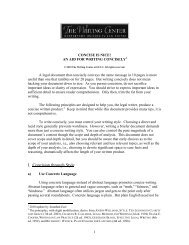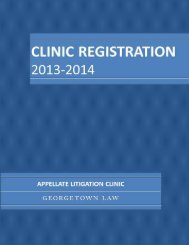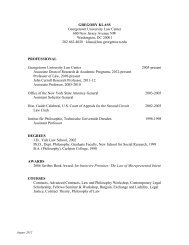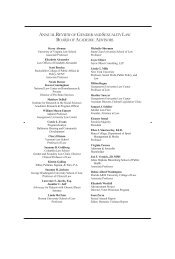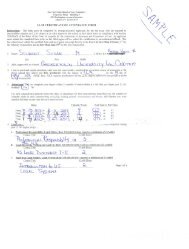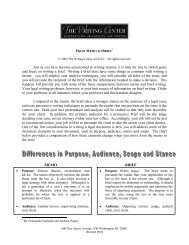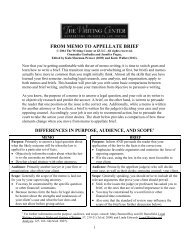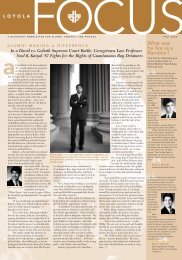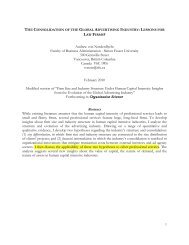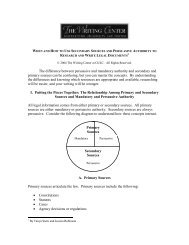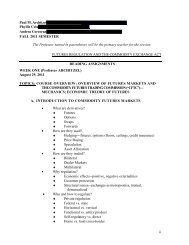Date: April 12, 2013 Topic: The Shrinking ... - Georgetown Law
Date: April 12, 2013 Topic: The Shrinking ... - Georgetown Law
Date: April 12, 2013 Topic: The Shrinking ... - Georgetown Law
You also want an ePaper? Increase the reach of your titles
YUMPU automatically turns print PDFs into web optimized ePapers that Google loves.
Technology and online access democratized travel, making it not only more<br />
affordable but also leading to highly individualized experience through unbundled<br />
services and amenities. This also impacted the way travel agents priced their services, for<br />
example a “fee for issuing a ticket or a nominal fee for changing it … or charging for<br />
information management, on-site pass port or back-office processing. Many travel agents<br />
invested in electronic servicing capabilities either independently or with technology<br />
partners, which had the two-fold objective of reducing their own service costs as well as<br />
providing entry into the new electronic market.” 50 <strong>The</strong>se changes also “led to a<br />
redefinition of who the customer is at each stage of the process, and aligning costs and<br />
revenues accordingly.” 51 Prior to the 1990s, “the customer paid nothing explicit for<br />
travel services. <strong>The</strong> cost of the service was bundled into the cost of the air ticket.” 52<br />
After the Internet-revolution, “the cost of services – in the form of service fees – is now<br />
apparent.” 53<br />
<strong>The</strong> concept of unbundled services for legal services is only beginning to be<br />
explored. Unbundled legal services involves “an agreement between the client and the<br />
lawyer to limit the scope of services that the lawyer renders.” 54 Unbundling can occur<br />
vertically, “break[ing] up the lawyer’s role into a number of limited legal services,<br />
empowering the client to select only those needed” or horizontally, “limit[ing] the<br />
lawyer’s involvement to a single issue or court process.” 55 A range of activities can be<br />
offered as unbundled services: advice, research, document drafting, negotiation, court<br />
appearances, or the handling of isolated matters. While legal has been much slower than<br />
travel to incorporate unbundled services, some predict that “[d]ue to customer education<br />
and demand, by 2032, law firms of all sizes will be proactively offering unbundled<br />
services in all areas of law and to clients of all demographics.” 56 Unbundling may also<br />
alter the way lawyers offer service, shifting from reactionary to “a preventative approach<br />
that will be used symptomatically and asymptomatically.” 57<br />
While unbundling holds the potential to open new markets for legal services,<br />
whether through lower-costs for traditional services or through new services such as<br />
preventative approaches, there are regulatory barriers constraining the legal profession<br />
that were not at issue for the travel industry. <strong>The</strong>se barriers include unauthorized practice<br />
restrictions on who may provide legal services and prohibitions on partnership and coownership/investment<br />
with nonlawyers. <strong>The</strong> ban on external ownership and investment<br />
by nonlawyers is particularly devastating for lawyers who want to “deliver en masse<br />
representation to the general public for routine wills, child custody, divorce, mortgage<br />
foreclosure, standard contracts, small business needs, immigration, bankruptcy, housing<br />
disputes, and other basic matters.” 58 “But the American Bar Association, the entity<br />
50 Harrel Associates, <strong>The</strong> Internet Travel Industry: What Consumers Should Expect and Need to Know, and Options for a Better Marketplace,<br />
Consumer WebWatch (Jun. 5, 2002), http://www.consumerwebwatch.org/pdfs/internet-travel-industry.pdf at 27.<br />
51 Id.<br />
52 Id.<br />
53 Harrel Associates, <strong>The</strong> Internet Travel Industry: What Consumers Should Expect and Need to Know, and Options for a Better Marketplace,<br />
Consumer WebWatch (Jun. 5, 2002), http://www.consumerwebwatch.org/pdfs/internet-travel-industry.pdf at 32.<br />
54 Forrest S. Mosten, Unbundled Legal Services for Today – and Predictions for the Future, Family Advocate Vol. 35, No. 2 (Fall 20<strong>12</strong>) at 14.<br />
See also Stephanie Kimbro, LIMITED SCOPE LEGAL REPRESENTATION: UNBUNDLING AND THE SELF-HELP CLIENT (20<strong>12</strong>) (“In this rapidly<br />
changing economic and legal climate, lawyers are seeking new methods for delivering their services efficiently and effectively while attracting<br />
new types of clients. For many firms, limited scope representation--also known as à la carte or unbundled legal services--may be the solution. By<br />
providing representation for a clearly defined portion of the client's legal needs, such as preparing a legal document or making limited court<br />
appearances, lawyers can market their practice to an entirely new client base and give their firm a competitive advantage.”).<br />
55 Id. at 14<br />
56 Id. at 15.<br />
57 Id.<br />
58 Renee Newman Knake, Democratizing the Delivery of Legal Services, 73 OHIO ST. L.J. 1, 5 (20<strong>12</strong>).<br />
9



